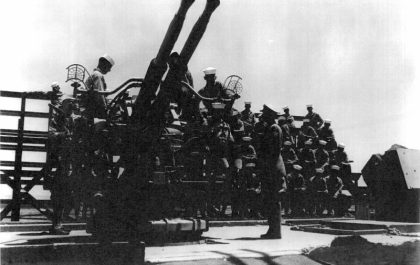The Coastwatchers chronicles the adventures of James Ellis Anderson, a young boy from Illinois sent to live with his eccentric aunt in Malibu during WWII. In the tradition of fiction from that period, TNT is presenting this original story by TNT Editor Suzanne Guldimann in serial installments. The first chapter, which introduces James and his Aunt Maddie, debuted in our November 4, 2022 issue and is available at topanganewtimes.com/storyland. Please join us, as we travel back in time to 1942.

“I don’t approve of war, James,” my aunt declared, putting down the evening edition of the paper with a grimace. The news was bad. “People and animals get killed and things get broken, but I don’t really see what the alternative is this time,” she said. “I’ve been asked to do some work on films for the war effort, and I’ve said yes. We all need to do what we can.”
I had a vision of the kinds of films that starred Spencer Tracy or Clark Gable and featured dog fights and spies, but it turned out it was training films for the military to help the men at the front. I never thought about it before, but all those documentaries and news reels they show you at the movie theater before they play the film you want to see have to be written by someone, and Aunt Maddie was a really good writer.
Her new job meant she had to go into town to meet with the filmmakers. It was more complicated than an ordinary film, she said, because in addition to all of the other writers, and producers, and the director there was the Information War Office and a bunch of officials from the military overseeing everything.
Often those meetings ran late, I got used to coming home to an empty house. Of course, Mr and Mrs Calzada were right next door, and Mrs Calzada always fixed me a lovely dinner and left something for Aunt Maddie for when she got home, but it felt lonely. I missed the cozy dinners in the kitchen with my aunt, and the quiet evenings together with the phonograph playing and a fire in the big fireplace in the living room.
I was alone on the evening of Wednesday, February 24, waiting for Aunt Maddie to get home. It had been a strange day. Everyone was talking about a Japanese submarine attack on an oil refinery up the coast in Santa Barbara the night before. It didn’t do much damage and no one was hurt, but it was the first attack on the US mainland, and everyone, from the kids at school to the garbage collector and the mailman, was talking about it. There were stories about U-boats off the coast heading towards L.A., and strange signals in the channel at night. It didn’t help that the Office of Naval Intelligence issued a warning that they expected another attack on the California coast in the next ten hours.That perpetual feeling of fear we all lived with had reached full boil, but it didn’t change the fact that I had to go to school, and Aunt Maddie was headed for a late night in town.
“Don’t wait up for me, James,” she said with a wry smile. “They argue so much the war may be over before they agree on what to include in this film, and I probably won’t be home until well after midnight.”
Aunt Maddie offered to arrange for me to stay at Jessie’s house that night. Jessie was one of the best friends I’ve ever had, but her house was like the Mad Hatter’s tea party from Alice in Wonderland—dogs, babies, nursemaids, weird house guests playing croquet in the garden or arguing about art in the living room and drinking things with strange names. I always felt uncomfortably shy there. I talked my aunt into letting me spend the night at home.
She agreed, but made me promise I would call Mr and Mrs Calzada if I needed anything or felt lonely.
The house was home now. It felt safe and friendly, I assured Aunt Maddie that I wasn’t worried about being alone for a few hours, not even at night. I ate my supper with a book called the Chessmen of Mars propped in front of me, and with Mouse sitting in my lap. The big gray cat was good company, but he made it hard to eat without spilling—maybe that was his intention.
I’d never had an animal before. Aunt Charlotte always said they were dirty and wouldn’t have them in the house. My sister Alice was old enough to remember the dog our parents had when our mother was still alive, but I couldn’t, and we’d never had a cat. Mouse wasn’t at all the way I imagined a cat would be. He wasn’t aloof or secretive. He liked to be where you were. He would sit in my lap and purr when I did my homework or read, and he would sit on Aunt Maddie’s desk for hours watching her type. She talked to him just like he was a person. So did Mrs Calzad. Mouse followed her around making remarks in a chirping kind of voice, and she replied to him in Spanish and called him Señor Gato. It was a special compliment when he came and rubbed his chin on your leg, or leapt into your lap for a nap. He didn’t like everyone. When visitors came he got shy and would vanish under the nearest bed. I always felt flattered when he came to sit with me, or when I woke up to find him sleeping next to me on the bed. I was glad to have his company that evening. It felt like having another person in the house.
After dinner, I visited the horses and goats. I did all of my homework. Then Mouse and I went back to my book. It was a good one—a terrific adventure except for some soppy romance—and I stayed up late reading in bed with the cat purring beside me, but I was asleep when the air raid siren shattered the quiet.
I sprang up in a panic, sending the book and the cat flying. Mouse vanished under the bed. I fumbled for my clothes and glasses, feeling lost and frightened. This was like the night the Star of Baja sank off the coast, only my aunt wasn’t there this time. I turned on the big radio in the living room, but there was just silence. It was impossible to tell if this was another drill or if something was happening. I knew that during a black out you were supposed to stay where you were, but I couldn’t do it. I made sure all the lights were out and raced across the yard to the Calzadas’ cottage.
Mr Calzada met me halfway. “I was coming to check on you, James,” he said. “I am going to see if I can find out what’s happening. Come into our house and wait with my wife. I’ll be back soon.”
He returned a few minutes later with Mr Zelle, but without any news. The four of us sat in the dark kitchen and waited, as the night ticked by minute by minute. It was so quiet that when a sound like distant thunder began it came as a shock.
None of us could stand sitting there, not knowing. We slipped out of the house single file, following Mr Calzada on the path to the beach. He knew his way so well, he didn’t need a light. The moon was up. It was a waxing quarter moon, its light was dimmed by the ocean mist, but still bright.
The beach was quiet and empty, and dark. Instead of the familiar string of lights from Los Angeles across the bay, there was just darkness, and in the sky above the city we could see flashes of light, followed by pops, cracks and booms. It was like watching distant fireworks, but with the horrible knowledge that this wasn’t a festive light show, it was the war, not far away in Europe or Asia, but right here at home. I felt sick.
We retreated back to the sheltering shadow of the tunnel under the highway and stood watching in silence. It was impossible to know what we were looking at. Was that enemy fire or our own air defense? Mrs Calzada took her husband’s hand, and put an arm around my shoulders. Mr Zelle stood on my other side.
All I could think of was that my aunt was out there somewhere. I found myself praying that she would be safe.
Eventually the barrage subsided. It felt like an eternity, but the explosions died away after the initial frenzy, and the whole episode was over in an hour. We made our way back to the Calzadas’ house. Mrs Calzada made up a bed for me on the sofa, but I was too anxious and too wide awake to sleep. I kept thinking about my aunt and all the people I knew who lived in town—my teacher, the man who drove our school bus, the ladies who worked in the school cafeteria, and Kitty’s sister who worked at the bank and always came home on weekends to help on the farm. The grownups sat around the radio waiting for news. When the broadcast came back on air it didn’t help much.
No one seemed to know what had happened. The first news reports said radar had picked up a bogie—that’s what they called an unidentified aircraft—more than a hundred miles off the coast, and that two waves of aircraft were seen over Redondo Beach, headed in the direction of the oil refinery at El Segundo.
The Army Interceptor Command ordered the blackout, and launched a counterattack. Anti-aircraft guns fired thousands of rounds and there were wild rumors about aircraft plants being bombed and Japanese planes being shot down over the Palos Verdes Peninsula. There was even a report that an enemy fighter had crashed in the middle of L.A., at 108th St and Vermont, but when officials arrived there was nothing there. The blackout order was finally lifted at 7:21 a.m., more than an hour after the sun was up.
Aunt Maddie roared up at 8:30 am. “It’s OK, James,” she reassured me, enfolding me in a tight embrace. “I came as soon as the roads were open.”
She looked tired and rumpled but calm. She joined us in the Calzadas’ kitchen. Everyone ate omelets and toast and drank coffee and asked questions.
“It was crazy,” Aunt Maddie said. “We were still arguing over the film project when it started. We had a good view from the window. There were searchlights and explosions practically overhead. It felt like the end of the world, but none of us saw or heard any aircraft, although other people said they did. One of the reasons it took so long to get home this morning was that there were unexploded anti-aircraft shells on the ground. It was a small taste of what they go through every night in Britain, I suppose. I hope no one was killed. I’m glad to be safe at home.”
I didn’t go to school that day—a lot of kids didn’t. Aunt Maddie and I spent the day at home together with the animals—Mouse didn’t emerge from under the bed until long after the all clear had sounded. I didn’t blame him. Jessie came over that afternoon, and we called Kitty to make sure she and her family were OK.
There were warnings that another attack was imminent and everyone was scared, but the ranch felt safe and peaceful. As the day wore on, the story in the news changed. There had been no confirmed sightings of enemy aircraft after all. No wreckage was recovered. The feared second attack never came. Later that day, the Secretary of the Navy told reporters that the entire incident was a false alarm. “War nerves,” he said. The problem was, no one believed him.
Five people died that night. Three were killed in car crashes, two died of heart attacks from stress and fear, fear that continued to grow in the background of all of our lives, even with the sun shining and the horror of the previous night receding in memory like a bad dream.





